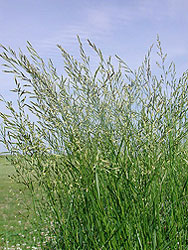Thanks to a farmer’s report, a USDA grass breeder has rediscovered a long-forgotten forage grass called meadow fescue that seems perfect for intensive rotational grazing.
 Charles Opitz found the grass growing in the deep shade of a remnant oak savannah on his dairy farm near Mineral Point, Wis. He discovered that his cows loved it and produced more milk when they ate it, so he reported the find to USDA’s Agricultural Research Service (ARS). It was geneticist Michael Casler with the U.S. Dairy Forage Research Center in Madison who acted on the report and identified the grass as meadow fescue, which was once popular after being introduced about 50 to 60 years before tall fescue. Casler used DNA markers to identify Opitz’s find.
Charles Opitz found the grass growing in the deep shade of a remnant oak savannah on his dairy farm near Mineral Point, Wis. He discovered that his cows loved it and produced more milk when they ate it, so he reported the find to USDA’s Agricultural Research Service (ARS). It was geneticist Michael Casler with the U.S. Dairy Forage Research Center in Madison who acted on the report and identified the grass as meadow fescue, which was once popular after being introduced about 50 to 60 years before tall fescue. Casler used DNA markers to identify Opitz’s find.
Meadow fescue is very winter-hardy and persistent, having survived decades of farming. It emerged from oak savannah refuges to dominate many pastures in the Midwest’s driftless region, named for its lack of glacial drift, the material left behind by retreating continental glaciers. Casler and his colleagues have since found the plant on more than 300 farms in the driftless region of Wisconsin, Iowa and Minnesota.
Researchers discovered that meadow fescue is 4 to 7 percent more digestible than other cool-season grasses dominant in the United States. In another study, meadow fescue had a nutritional forage quality advantage over tall fescue and orchardgrass that may compensate for its slightly lower annual yield further north, as reported in the Agronomy Journal. Also, the yield gap begins to close with the frequent harvesting involved in intensive grazing. Casler has developed a new variety of meadow fescue called Hidden Valley. Seed for the new variety is being grown for future release.
Read more here from USDA-ARS.

3 Comments on “Forgotten Forage Grass Rediscovered”
Now thats a great discovery! I am amazed that there are other grasses that horses can feed, plus it is more digestible making it stomach friendly.
Now thats a great discovery! I am amazed that there are other grasses that horses can feed, plus it is more digestible making it stomach friendly.
Now thats a great discovery! I am amazed that there are other grasses that horses can feed, plus it is more digestible making it stomach friendly.